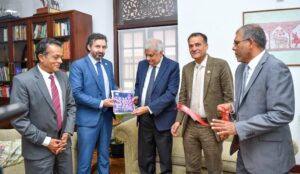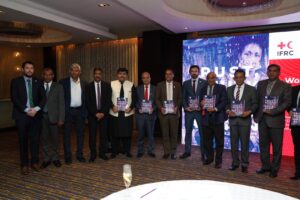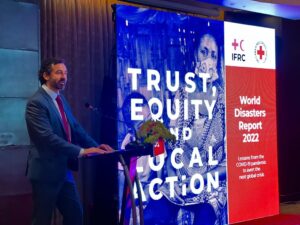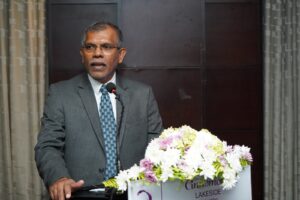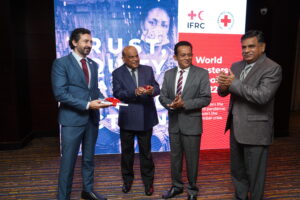Red Cross Launches World Disaster Report 2022 in Colombo, Sri Lanka
Strong local providers are a must for efficient humanitarian response; Red Cross disaster report finds.
The International Federation of Red Cross and Red Crescent Societies (IFRC) launched the World Disaster Report (WDR) 2022 in Sri Lanka, in the presence of the movement’s leaders for South Asia. The Sri Lanka Red Cross Society (SLRCS) hosted the event in collaboration with the IFRC. With the world having to face one of the largest public health emergencies (PHE) in decades, it is critical that the world work together to develop a more inclusive and resilient disease outbreak management system.
At the launch event, IFRC Regional Director for Asia Pacific, Alexander Matheou commented, “In the context of the Asia Pacific, where six of the top ten most vulnerable countries in the world are prone to natural disasters, with a USD 50 billion economic cost in 2021. In the Red Cross, we strive to do this by engaging our local actors and partners to come up with solutions tailored to the communities’ context, something that is accessible, affordable, and works for everyone, especially for the most vulnerable.”
This report focuses on preparedness: preparation for COVID-19 was insufficient, and the world must now better prepare for the next public health emergency. Being truly prepared entails being ready to prevent, respond to, and recover from an emergency and learning lessons for the next time. In other words, readiness is a continuous, ongoing process. The International Red Cross and Red Crescent Movement strive to achieve this movement by engaging local actors and partners to develop solutions tailored to the communities’ context, solutions that are accessible, affordable, and work for everyone, particularly the most vulnerable.
According to the findings of this report, communities must trust local providers for response efforts to be successful. Building trust in communities is critical because when people believe public health messages, they are more likely to comply with public health measures designed to slow disease spread and save lives. Similarly, millions of people could only be vaccinated in record time when most believed the vaccines were safe and effective.
“This report is being launched as an important event in a series of events that take place in the coming two days. The leaders of South Asia are meeting in Colombo to discuss common challenges faced by the national societies in our region. All these challenges must be resolved, and the national societies in this region are part and parcel of the solution as they are auxiliaries to the governments in their respective countries in humanitarian activities”, added the SLRCS Director General, Dr. Mahesh Gunasekara.
To avoid duplication with any other COVID-19 report, the report was created with as much evidence as possible and as broadly as possible. It covers the local community, emergency preparedness, and disaster law. It emphasises three elements that were not adequately emphasised during the COVID-19 pandemic: trust, equity, and local action.
With six chapters and six essential actions and recommendations aimed at being prepared for a future global health emergency, all of which contribute to preparation: Strengthening prevention and preparedness at the local level (one-health approach), Leveraging the roles and capacities of communities and local actors through integrated community health systems, Building global solidarity mechanisms to ensure that pandemic response products reach all communities (sharing of scientific research, vaccine inequities, regional production, and distribution centre around the world), Protecting communities against the socio-economic impacts of public health emergencies (women, undocumented migrants, expand and improve social security), Collecting local data and harnessing it to take action (collect more data at the local level/community feedback) and Strengthening legal preparedness for public health emergencies (Disaster Law, review of PHE laws and regulations, domestic legal preparedness).
The panel invites you to join the International Federation of Red Cross and Red Crescent Societies to discuss the World Disaster Report findings and think about how to work together to build a more inclusive and resilient disease outbreak management system. These discussions are critical for strengthening and improving health emergency and disaster risk management in future outbreaks. Bridging these gaps can reduce outbreak-related deaths, diseases, and psychosocial impacts on communities.
